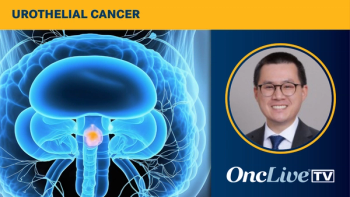
Study EV-103 in Advanced Bladder Cancer
Ali R. Khaki, MD, describes the impact of the EV-103 study of enfortumab vedotin in advanced bladder cancer.
Episodes in this series
Ali R. Khaki, MD: EV-103 cohort A investigated the use of enfortumab vedotin with pembrolizumab as a combination therapy for patients who are cisplatin ineligible. It’s a single-arm study, but the results are pretty impressive. They had a confirmed objective response rate of 73%, including a 17.8% complete response rate and a 57% response rate in those with liver metastases. The duration of response was over 2 years, at 25.6 months. These are very impressive numbers, but this was a very small trial. I’m not sure if this has changed my practice. The sample size was small. It’s an uncontrolled trial. We need more data before I recommend adopting this as the new frontline therapy for patients who are cisplatin ineligible.
My practice for people who are cisplatin ineligible, is to adopt the JAVELIN Bladder 100 model of carboplatin combination chemotherapy followed by maintenance avelumab immunotherapy. We have a higher level of evidence to support this practice. That’s what my standard of care is. In patients who are platinum ineligible, who aren’t even candidates for carboplatin chemotherapy, my typical practice is to use pembrolizumab monotherapy. Especially if someone has symptomatic disease or is in great need of an urgent response because of the pace of their disease, that might be a population where I reach for this combination despite pretty premature data, because of the impressive results: the response rate over 70% and durable response of over 2 years.
With the majority of patients I treat, even frail patients, we’re often able to get them through at least 4 cycles of combination carboplatin chemotherapy. That’s still my preferred approach for first-line therapy when possible. There are some patients who, given their frailty or comorbidities, may not be platinum chemotherapy candidates. That’s when my typical practice has been immune checkpoint inhibitor monotherapy. But in patients with very symptomatic or aggressive disease, with liver or bone metastasis—particular clinical features that might suggest more metastatic biology—those are whom I might consider for this combination of EV [enfortumab vedotin] plus pembrolizumab as initial therapy.
The big goal is making sure patients who are eligible get all lines of therapy they’re able to get. With frail patients, that might be a setting, especially if you think you have only 1 shot at a treatment, to make sure you give people all active agents. If you can’t get platinum chemotherapy, the 2 most active agents are probably immune checkpoint inhibitor and enfortumab vedotin.
Transcript edited for clarity.







































